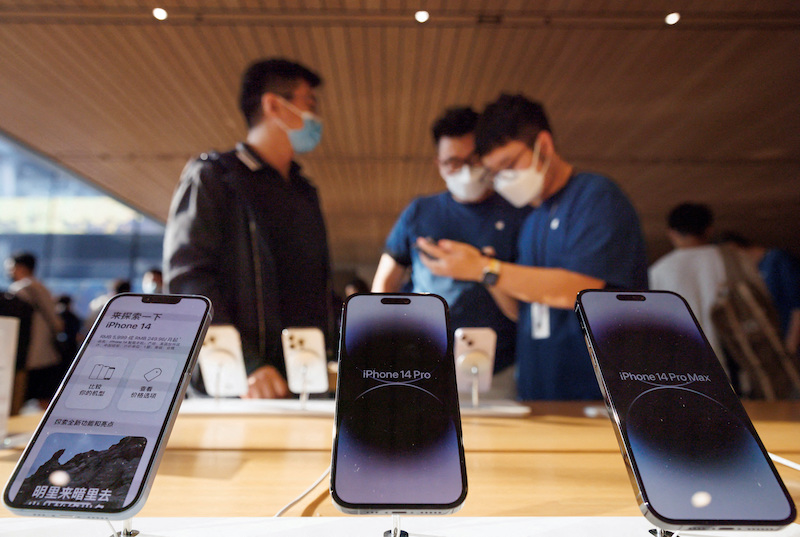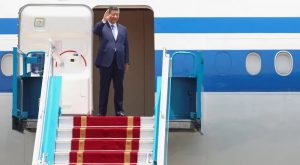Beijing’s curbs on use of iPhones has spread from central government workers to local governments and state-owned companies, Nikkei reported on Friday.
Central ministries and agencies restricted use of foreign products for official business in about 2020, but sources have told Nikkei that the curbs were expanded in August to employees of local governments, from prefectures to cities, and state-owned enterprises.
News that Beijing told employees at some central government agencies last month to stop using Apple mobiles at work has rocked the US tech giant, which has lost about $190 billion in market cap after falling more than 6% over the past two days.
Suppliers such as Qualcomm have also been hit hard. Qualcomm, one of the US companies with the largest China presence, has tumbled nearly 7% to lead losses among major tech firms. Other suppliers such as Broadcom, Skyworks Solutions and Texas Instruments have also fallen between 1.8% and 7.3%.
ALSO SEE: Key US Lawmaker Wants End to Chip Exports to Huawei, SMIC
Adding pressure for Apple in one of its biggest markets, Huawei launched two new smartphones – the foldable Mate X5, and the Mate 60 Pro+, a new addition to the line that drew global attention for showcasing resilience to US sanctions.
These two developments have shaken tech stocks worldwide.
In Taipei, Apple supplier Largan Precision, which makes camera lenses, dropped more than 4%, while TSMC, the world’s leading contract chipmaker, fell 0.6% on Friday.
China’s Luxshare Precision Industry, maker of connector cables for the iPhone and MacBook, as well as AirPods, and owner of factories capable of making iPhones, fell 2%. Its shares were also hit last week by the Huawei launch.
Some analysts feel the Huawei moves could be a first step in comeback efforts by China’s “national champion” to rival Apple.
“We believe Huawei’s activity this time was well-prepared and not sudden,” Ivan Lam, an analyst at Counterpoint, whose outlook for the new products exceeds previous estimation, said.
“It can manage the psychological expectations of the target consumer group before Apple’s press conference.”
And in contrast to the hit for Apple suppliers, Huawei’s extended recent gains.
Shares in Semiconductor Manufacturing International Corp (SMIC), which is believed to have made the advanced chip in Huawei’s new smartphone, rose 1%, and China’s semiconductor sector also gained 1%.
Ban applies to state workers and visitors
Amid some uncertainty on how wide the iPhone ban has extended, one employee at an affected state-owned enterprise (SOE) in the capital told Reuters the ban applied to workers and visitors.
“Anyone, including business visitors, who enters our work area cannot bring in their iPhones,” said the source, one of two SOE employees who said they were told of the ban in recent weeks.
The source, who spoke on condition of anonymity, said the company was giving employees a subsidy of 100 yuan to 200 yuan ($13 to $26) to switch to local brands. Some staff at other SOEs, however, said they had not been banned from using iPhones.
While the number of central government employees is not public, Bank of America estimated such a ban could cut iPhone sales by 5 million to 10 million units a year from China’s annual total of up to 50 million.
By contrast, Huawei’s smartphone sales, driven by the new Mate 60 Pro, could jump 65% this year to 38 million, in the absence of some “non-commercial risks”, Ming-Chi Kuo, an analyst at TF International Securities, said.
However, Canalys analyst Nicole Peng said Huawei could present a greater threat to domestic peers, such as Honor, which had benefited from Huawei’s woes.
Several Wall Street analysts said the curbs showed that even a company with good ties to the government and a large presence in the world’s second-biggest economy was not immune to rising tension between the two nations.
Beijing looking to cut reliance on US tech
That friction has worsened in recent years as Washington tries to restrict China’s access to key technologies including cutting-edge chip technology, and Beijing looks to reduce its reliance on American tech.
The US Commerce Department is seeking more information on the “character and composition” of the new Huawei chip that may violate trade curbs, it said on Thursday.
“The restrictions … since 2019 have knocked Huawei down and forced it to reinvent itself – at a substantial cost to the (Chinese) government,” it added.
“We are continually working to assess and, when appropriate, update our controls based on the dynamic threat environment and we will not hesitate to take appropriate action to protect US national security.”
A teardown by research firm TechInsights showed more China-made chip components in the Mate 60 Pro than previous models, a sign of Beijing’s progress.
‘More aggressive moves seen as China’s economy stalls’
Lawmakers of both major US parties have been vocal in their concerns about national security risks allegedly created by China’s products, pressuring the Biden administration to get even more aggressive with Beijing.
Republican lawmaker Mike Gallagher, chairman of the House panel on China, said China’s wider ban on Apple was not surprising and showed how China is trying to limit a Western company’s market access to the nation.
“This is textbook Chinese Communist Party behaviour – promote PRC (People’s Republic of China) national champions in telecommunications, and slowly squeeze Western companies’ market access,” Gallagher said.
US Senator Mark Warner, a Democrat and the chair of the Senate Intelligence Committee, shared similar concerns, saying: “As the Chinese economy stalls, we can potentially anticipate more aggressive moves against foreign businesses”.
A crucial market for Apple
China has been a bright spot for Apple in an otherwise tough period for iPhone sales. The tech giant gets nearly a fifth of its revenue from the country.
“China is a crucial market for Apple, not just because it’s a super-important manufacturing hub, but because the country is an increasingly important source of revenues,” Susannah Streeter, head of money and markets at Hargreaves Lansdown, said.
“Already rivals are closing the gap in high-end smartphone sales, and if the situation were to escalate this could potentially allow competitors to have a greater chance of stealing Apple’s crown,” Streeter said.
Apple could, however, see a demand boost after an event next week where it is expected to unveil its iPhone 15 line-up, as well as new smartwatches.
- Reuters with additional editing by Jim Pollard
NOTE: The headline and details in this report were modified when further details emerged on Sept 8, 2023.
ALSO SEE:
China Tells State Officials to Stop Using iPhones at Work: WSJ
Huawei’s Chip Breakthrough ‘May Spur Tougher US Tech Curbs’
New Huawei Phone Spurs Fear China Got Around US Chip Curbs
China Firms to Make Apple Watch, MacBook in Vietnam – Nikkei
Apple in Negotiations to Manufacture MacBooks in Thailand
Apple Bets on India’s Middle Class in Hunt for Future Markets
























